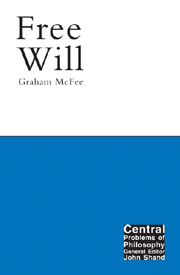Book contents
- Frontmatter
- Contents
- Preface and acknowledgements
- 1 Free will: the issue
- 2 Determinism: exposition
- 3 Determinism: qualifications and clarifications
- 4 Libertarianism: two varieties
- 5 Compatibilism I: the “utilitarian” position
- 6 Compatibilism II: the two-language view
- 7 The irrelevance of determinism
- 8 The very idea of causal necessity
- 9 Conclusions and reflections on philosophical method
- Appendix: chaos theory and determinism
- Notes
- A guide to further reading
- Bibliography
- Index
3 - Determinism: qualifications and clarifications
- Frontmatter
- Contents
- Preface and acknowledgements
- 1 Free will: the issue
- 2 Determinism: exposition
- 3 Determinism: qualifications and clarifications
- 4 Libertarianism: two varieties
- 5 Compatibilism I: the “utilitarian” position
- 6 Compatibilism II: the two-language view
- 7 The irrelevance of determinism
- 8 The very idea of causal necessity
- 9 Conclusions and reflections on philosophical method
- Appendix: chaos theory and determinism
- Notes
- A guide to further reading
- Bibliography
- Index
Summary
Introduction
Initially, this chapter considers two lines of objection to the determinist argument, both rooted in the idea that it is not satisfactory as an argument. As noted previously, there are, in effect, three responses that might legitimately be made to any argument: the first is to accept its conclusion – to find it compelling. This means accepting both that the premises from which it is constructed are true and that the truth of the conclusion follows from the truth of the premises. (This idea of “following from” is what it means to speak of the argument as valid.) In passing, we see here one virtue of formalizing the determinist argument as we did (Chapter 2, p. 21): it allows us to identify and scrutinize the constituent premises.
However, someone planning to reject the conclusion of an argument must either (as a second response) reject one or more of the premises of that argument, reject the truth of the premises, as we might say; or (third response) must urge that the conclusion does not follow from those premises, reject the logic of the argument. In Chapter 2, some reasons to accept the truth of the premises were offered. The possibility of denying those premises will occupy us in Chapters 4, 5, 6, and 8. Here, though, I consider objections to the logic of the argument. These are, effectively, of three main types: objections to this argument, to the use of argument in this context, and to the supposed conclusion having the implications claimed by an argument such as this. I shall consider them in succeeding sections.
- Type
- Chapter
- Information
- Free Will , pp. 35 - 52Publisher: Acumen PublishingPrint publication year: 2000



